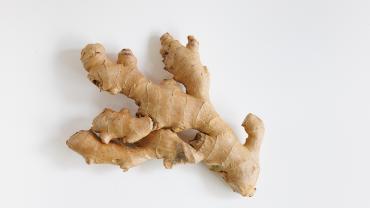
Ginger (Zingiber officinale) is a botanical known for its applications in cooking and as a health-supportive agent. It has been shown in studies to support the body’s response to inflammation and oxidative stress. Some of its constituents, including gingerol, shogaol, and paradol, have been shown to play a supportive role in certain aspects of cardiovascular health.
One mechanism of action of ginger is believed to be through the inflammation pathways. Laboratory studies have shown that 6-shogaol can act as a peroxisome proliferator-activated receptor-gamma (PPAR-gamma) agonist. Other constituents of ginger have been shown in clinical studies to suppress tumor necrosis factor-alpha (TNF-α) activity. A meta-analysis reported statistically significant reductions in TNF-α levels in the presence of ginger supplementation.
The inflammatory response has been linked to the pathophysiology of diabetes. In addition, ginger is believed to have influence on glucose metabolism through the action of its constituents. Certain gingerols have been shown to modulate the activity of glucose transporter GLUT4 and help increase glucose uptake into skeletal muscle cells. Supplementation with ginger has also been shown to influence the activity of certain enzymes related to glycogen synthesis. Gingerols have also been shown to influence the activity of α-glucosidase and α-amylase.
A recently published systematic review and meta-analysis of randomized control trials by Ebrahimzadeh and colleagues explored the efficacy of supplementation with ginger in individuals with type 2 diabetes mellitus (T2DM). Statistically significant reductions in fasting blood sugar (FBS), and hemoglobin A1c (HbA1c) were observed in treatment groups as compared to a placebo.
A randomized control trial reported in the meta-analysis by Ebrahimzadeh and colleagues reported that supplementation with 1.2 g of ginger daily for 3 months in individuals with T2DM showed statistically significant reductions in both FBS and HbA1c. Another study that was included showed significant improvements in FBS and HbA1c after 10 weeks of supplementation with 2 g of ginger daily.
Improvements in both systolic and diastolic blood pressure in the presence of ginger supplementation were reported in the meta-analysis by Ebrahimzadeh and colleagues. This is believed to be due to the health-supportive role of ginger in the presence of oxidative stress. Ginger has been shown to help reduce lipid peroxidation and influence plasma nitric oxide levels. It has also been shown to directly affect the renin-angiotensin system and block voltage-dependent calcium channels.
The role of ginger in the support of human health is robust. Researchers continue to elucidate its complex activity within the body. However, based on current research, ginger may support the body’s response to oxidative stress and inflammation. It may also help support cardiovascular health and glucose metabolism.
By Colleen Ambrose, ND, MAT